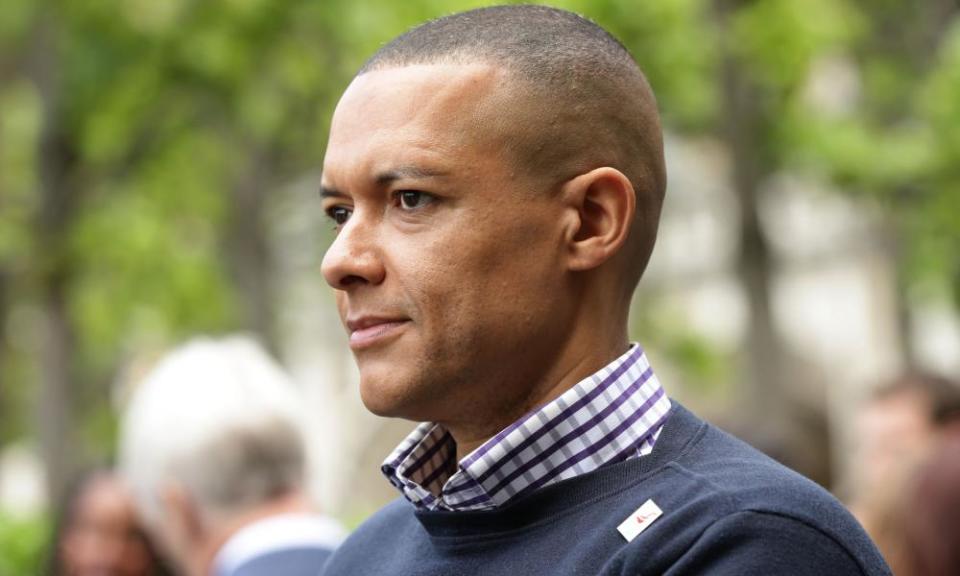Clive Lewis denies registering websites for Labour leadership bid

Clive Lewis, who resigned from the shadow cabinet after voting against the Brexit bill, has denied secretly registering internet addresses linked to a potential leadership bid and warned that unnamed Labour figures were taking an “unhealthy interest” in him.
Lewis, the MP for Norwich South, flatly denied that he, or anyone working for him, was responsible for registering several internet domain names, including cliveforleader.org.uk, shortly after he joined the shadow cabinet last summer, as revealed in the Huffington Post. “None of this is true: I haven’t done this,” he said.
He also told the Guardian his solicitors had written to the Sunday Times warning that he plans to take legal action against the paper over a separate story, casting doubt about his military record in Afghanistan as an army reservist.
Lewis suggested both stories had originated from “people out there”, who don’t want to see a leftwinger succeed Jeremy Corbyn, and would like the Labour leadership to pass to a more centrist MP.
“It looks clear to me that there are people out there whose interest I have piqued and who are taking an unhealthy interest in me,” he said. “In other circumstances, it would be flattering.”
When Lewis, previously considered a close ally of Corbyn, stepped down as shadow business secretary after defying Labour’s three-line whip on the article 50 legislation this month, there was speculation in Westminster that he could be preparing for a future leadership bid.
More than 50 Labour MPs, including three shadow cabinet ministers, refused to vote for the article 50 bill, but Corbyn and the shadow Brexit secretary, Keir Starmer, believed the party must not be seen to “block Brexit”, or to appear not to respect the referendum result.
Lewis denied he was plotting against Corbyn, saying: “Jeremy is the elected leader; we have got a leader. I’m not entering into the game of speculation.”
The Sunday Times story, published earlier this month, cited military sources as saying Lewis had led a combat camera team filming promotional videos, adding: “The role was unlikely to involve taking part in firefights, the sources said.”
Lewis said he had diaries and documentation detailing combat operations in which he was involved in Helmand province in Afghanistan in 2009. He has previously spoken about having depression after returning to the UK.
Corbyn last week batted away questions about his leadership after an embarrassing byelection defeat in Copeland, in which the Conservatives took a seat held by Labour since 1935, a very rare example of a government taking a byelection seat from the opposition.
Andrew Gwynne, who ran the Copeland byelection for Labour and recently took on responsibility for coordinating its election campaigns, jointly with another MP, Ian Lavery, received a warm reception at the weekly meeting of the parliamentary Labour party (PLP) on Monday night when he reported on the campaign.
Gwynne said afterwards: “As I said in the PLP meeting, I want to pay tribute to the thousands of members, regional Labour staff, our outstanding candidates, and my colleagues in the PLP who all turned out to fight hard in these byelections.”
Some MPs were frustrated that Corybn had failed to turn up for the meeting. Others expressed irritation at recent comments by Shami Chakrabarti, the Labour peer and shadow attorney general, about the Copeland and Stoke results.
Chakrabarti, who was director of civil rights campaign group Liberty before she joined the Labour frontbench, told the BBC’s Andrew Marr on Sunday that Copeland was “one of those constituencies that was neglected by my own party over some years”.
A Labour source speaking after Monday night’s meeting, which Chakrabarti did not attend, said: “The PLP were very clear that they think all members of the PLP should be defending what the last Labour government did: that was expressed by a number of them.”
Graham Jones, the MP for Hyndburn in Lancashire, told journalists outside the meeting a number of MPs had criticised Chakarbarti. “There’s a degree of frustration: she’s not elected.”
Lilian Greenwood, who resigned as shadow transport secretary last summer, reportedly gave a long list of the explanations that allies of Corbyn have given for the Copeland defeat since the weekend, from the weather to Tony Blair’s recent Brexit speech, and asked whether anything was missing – a question regarded by MPs as a dig at the leadership.
Separately on Monday, in another signal of the febrile atmosphere in the party, a spokesman for John McDonnell sought to withdraw comments the shadow chancellor made in an article suggesting a “soft coup” against Corbyn was under way.
In the piece on the Labour Briefing website, dated 26 February, McDonnell said: “The tactics include daily and constant behind-the-scenes non-attributable briefings against Jeremy and his shadow cabinet every time he or his shadow ministers make a statement, intervene in parliament or launch a policy. The plotters use every opportunity to chip away at Jeremy’s standing to seek to demean him and undermine support for him in the Labour party and among Labour supporters.”
A spokesperson for McDonnell said on Monday: “This article was written over a week ago in response to the intervention from Tony Blair. As John said yesterday, he wants us all to focus on party unity following last week’s byelection results.”
Any challenger to Corbyn would have to gather the signatures of 15% of the party’s MPs and MEPs – a threshold some in the party hope to reduce to 5% in a measure due to be discussed at Labour’s autumn conference.
MPs on the left wing of the party, including the shadow business secretary, Rebecca Long-Bailey – known to be the favoured choice of some in Corbyn’s team – are thought to be unlikely to gather enough nominations.
A spokesperson for the Sunday Times said the newspaper had not yet received a complaint from Lewis.

 Yahoo News
Yahoo News 